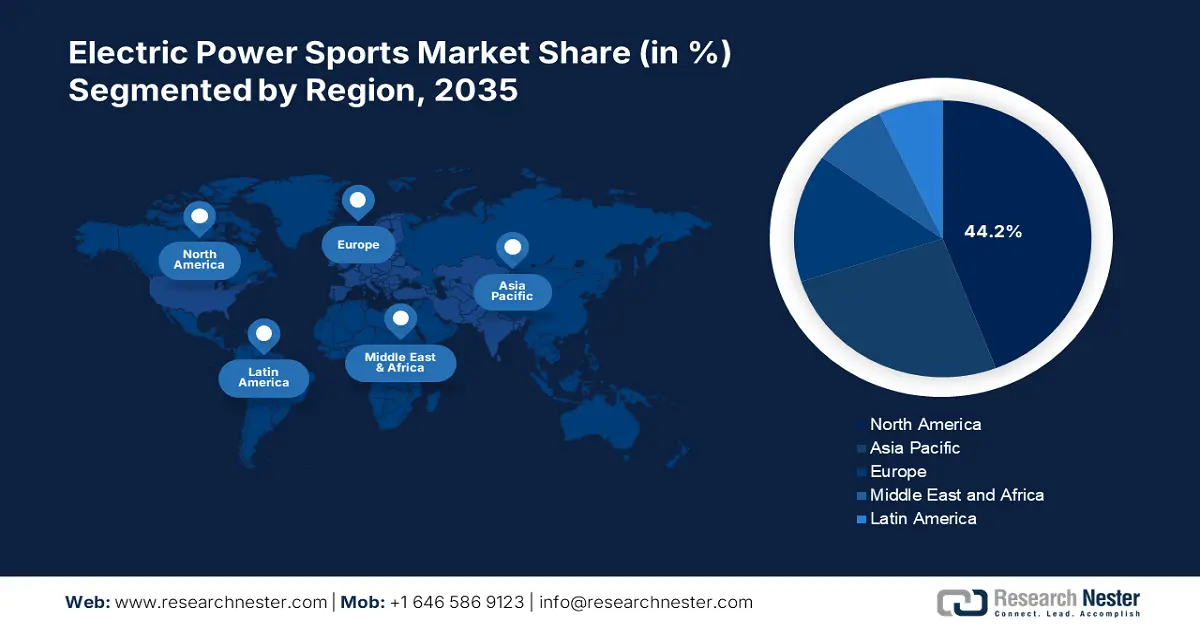Electric Power Sports Market Regional Analysis:
North America Market Analysis
By the end of 2035, North America electric power sports market is set to hold over 44.2% revenue share, driven by increasing consumer demand for more environmentally friendly recreational options and improved electric vehicle technology. Growing environmental awareness and supportive government policies, such as tax incentives and funding for charging infrastructure, have contributed to increased adoption. At the same time, post-pandemic, interest in outdoor recreation has surged, driving greater demand for electric power sports, thus making North America a significant market for worldwide electric mobility transition.
The U.S. electric power sports market is witnessing a surge in strategic collaborations between industry leaders to foster knowledge, experience, and enhance market penetration. For instance, in March 2021, according to Polaris' new electrification strategy, it collaborated with Zero Motorcycles to Co-Develop Electric Vehicles as a foundation for rEV'd up. Furthermore, a 10-year exclusive partnership agreement in off-road vehicles and snowmobiles has been signed between Polaris and Zero Motorcycles to combine Zero's proven electric powertrain technology and Polaris' industry leadership.
The market in Canada is evolving at a steady pace as it embraces the support from well-established key players in the market to flourish. For instance, in April 2024, Honda Motor Co., Ltd. announced that it intends to construct a comprehensive EV value chain in Canada with an estimated investment of USD 10.8 million, including investment from joint venture partners. In Alliston, Ontario, Honda has started assessing the conditions necessary to construct a cutting-edge and ecologically conscious Honda EV plant as well as a standalone Honda EV battery plant.
Asia Pacific Market Statistics
Asia Pacific is expected to witness substantial growth in the electric power sports market during the forecast timeline from 2025 to 2035. The growth is stimulated by the rapid pace of urbanization, increasing disposable incomes, and environmental awareness. The growth drivers are being pushed by government initiatives on electric mobility through various subsidies and charging infrastructure developments. Furthermore, well-established manufacturers complemented by a growing innovation ecosystem of startups, make Asia-Pacific critically important to the global future of market.
Consumers in India favor electric two-wheelers owing to their availability of varied product options, dependable technological features, changing purchasing patterns, and adaptable ownership arrangements. For instance, in September 2023, it was published in McKinsey & Company that by 2030, the sales of electric two-wheeler vehicles are expected to surge to 60-70%. The increased use of electric two-wheelers will support India’s alignment with global climate policies, such as faster adoption and manufacturing of electric vehicles, aimed at reducing air pollution and improving traffic conditions.
China focuses on moving strategically with the growth of the market to expand its reach and widen its consumer base through collaborations. For instance, in May 2024, Leapmotor, a Chinese EV manufacturer, planned to join forces with Stellantis to enter India. Two electric vehicles (EVs) will be introduced by the company to its international markets, the D-segment sports utility vehicle (SUV) C10 and a small electric city car known as the T03. Leapmotor will utilize Stellantis’s manufacturing networks and facilities for the regions that will face high tariffs.


